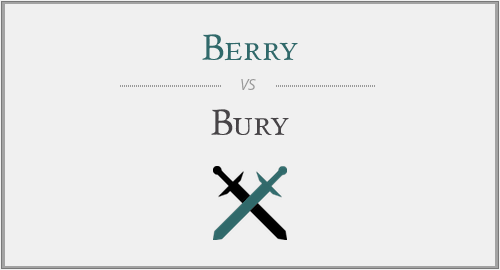People feel that the English language is tricky and confusing, but it doesn't necessarily need to be. There are many words in the English dictionary that have the same pronunciation but different spellings. We refer to them as homophones.
They’re the words that sound the same but have very different meanings and spellings too. If you learn about those in detail, you’ll know that homophones are only slightly tricky but make the English language quite interesting too.
Homophones
Homophones are words that share the same pronunciation or sound, regardless of their meaning and how they are spelled. Words that sound the same and also spell the same but have different meanings are called homographs.
If you’re ready to learn all you can about homophones, let’s start with berry vs. bury, shall we?
Berry – Noun
The word berry comes from the word “Berie," belonging to the old English language. Its plural is berries.

- • A berry is a small fruit with tiny seeds, such as raspberry or blackberry. It is typically juicy and fleshy, regardless of what botanical structure it features.
- • As a noun, berry also refers to various kernels or seeds belonging to dried wheat.
- • Berry also means the egg of a lobster.
- • In Botany, berry means an indehiscent fruit coming from a single ovary. It comprises an entire wall of flesh, such as the tomato or grape.
Berry - Verb Intransitive
As a verb intransitive, berry means to produce or bear berries-the fruit.
Examples
- • These strawberry tarts have a delicious raspberry filling inside. What a clever way to use squishy fruit!
- • The restaurant will add goji berry and chamomile tea to their menu this month.
- • When preparing the batter, you may lightly press the berries and chocolate chips with your fingertips.
- • Berry slush is a delicious summer treat. It delivers an instant burst of flavors and energy.
Bury- Verb Transitive
The word bury comes from “Byrgan," an Old English word. It typically means to raise a mound when concealing, hiding, or to bury something under the earth.
- • Bury means to conceal or cover a piece of earth. It also means to hide.
- • Bury refers to the ritualistic disposal of a corpse by means apart from cremation or interment.
- • Bury is the act of placing a corpse in a tomb, grave, or sea as its final resting place.
- • Bury means to place something on the ground.
Examples
- • They will bury their father’s mortal remains in the cemetery behind the Church.
- • The President is introducing reforms to change the way their bury the dead.
- • Christian families bury their loved ones under the earth according to religious beliefs.
- • We advise you not to park your car in the neighbor's space. She will bury it in the snow.
- • The mayor announced that the area they had chosen to bury the material would not be redeveloped in the future.
- • It is time to bury the past, pick up the pieces, and look forward to a better future.




Have a discussion about this article with the community:
Report Comment
We're doing our best to make sure our content is useful, accurate and safe.
If by any chance you spot an inappropriate comment while navigating through our website please use this form to let us know, and we'll take care of it shortly.
Attachment
You need to be logged in to favorite.
Log In